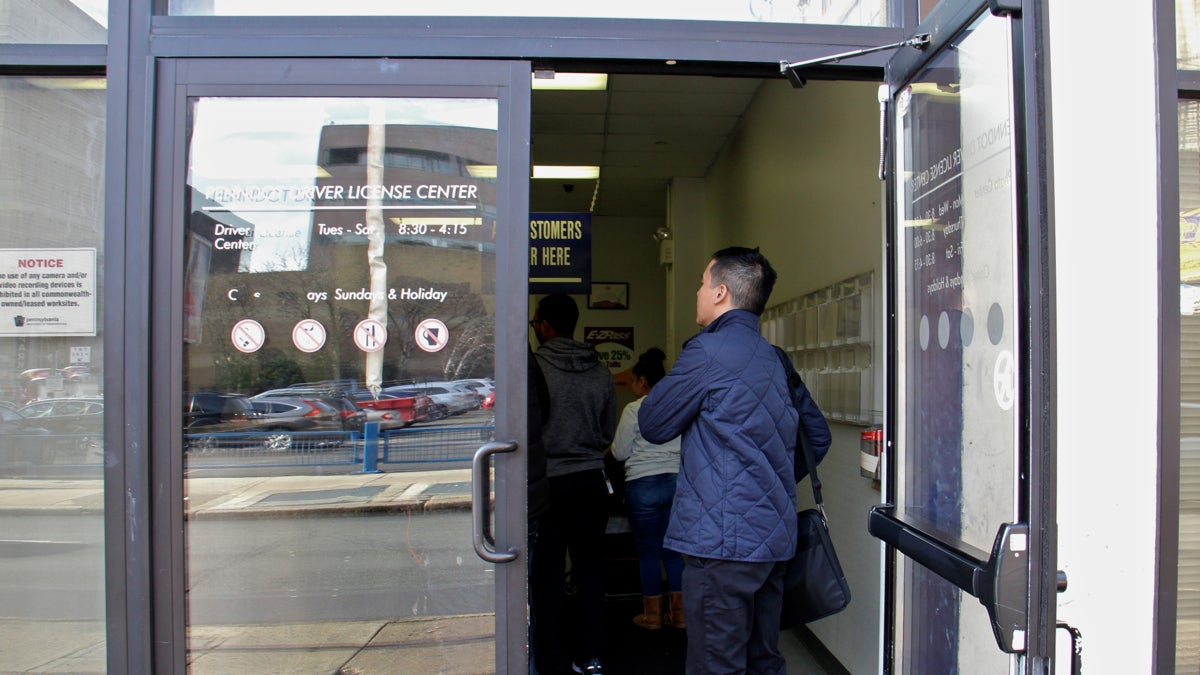Pa. driver’s license won’t be valid identification at some U.S. facilities

Customers line up at the PennDOT Driver License Center at Eight and Arch streets in Philadelphia. (Emma Lee/WHYY)
At the risk of inconveniencing residents, Pennsylvania is one of a handful of states playing chicken with a federal security law passed after 9/11.
Starting Jan. 30, Pennsylvania driver’s licenses won’t be accepted as identification to enter federal agencies (except those which provide benefits), military bases or nuclear power plants, under a law called the REAL ID Act.
Pennsylvania residents still will be able to board a domestic flight with that identification until January 2018.
Costs and concerns
Passed in 2005 as a part of a package of security reforms aimed at combating terrorism, the REAL ID Act requires states to standardize security measures for issuing cards and share driver’s license information with other states.
Pennsylvania and more than a dozen other states resisted the measure; in 2012, the commonwealth passed a law barring it from complying with the federal mandate. Some states, including New Jersey, have been granted extensions, but Kentucky, Maine, Minnesota, Missouri, Montana, Oklahoma, South Carolina, Washington and Pennsylvania are staring down the January 2017 deadline. Delaware and 24 other states are in compliance.
Pennsylvania and the other holdouts cite issues ranging from the heavy lift of funding the changes to what some view as an encroachment on civil liberties.
“REAL ID, as written, is a terrible law,” said Andy Hoover, communications director with the Pennsylvania branch of the American Civil Liberties Union, which supported Pennsylvania’s Act 38 to block the law’s implementation.
Among the concerns, he said, is the mandate to share personal information between states, which could pose cybersecurity risks.
“One of the biggest concerns was about the national database,” said Hoover. Not only would that be an irresistible target for hackers, he said, but it’s the basis for a national ID card and gives federal authorities control over state-issued IDs.
Pennsylvania state legislators also raised concerns about the cost to implement the changes, at the time estimated to be $100 million up front and $40 million a year to maintain.
‘Someone has to give’
As the conflict continues, Pennsylvania has taken steps to make its licenses more secure.
“In a lot of ways, Pennsylvania already is compliant,” said Rich Kirkpatrick, communications director of the Pennsylvania Department of Transportation, which issues state driver’s licenses. “Over the years, we’ve added a lot of security requirements,” named under the act, including changes to the physical cards to make them harder to counterfeit. At this point, PennDOT does not have an estimate for how much full implementation would cost, according to Kirkpatrick, but said it would take 18 to 24 months to roll out all of the changes.
Without agreement between state and federal law, he said, PennDOT must stop short of full implementation.
“While we understand frustration with the cost of this unfunded federal mandate, our failure to comply because of the prohibition of current law will be a burden for Pennsylvanians,” said PennDOT Secretary Leslie S. Richards, in a statement issued in October.
Homeland Security, which has issued repeated extensions to allow states to get on board, has drawn a line starting in 2017.
“For states that did not have a previous extension, and were not granted an extension for 2017, enforcement is ongoing,” said a DHS representative in a statement.
In spite of that tough talk, some of the more contentious parts of the law are lying fallow. DHS said there is no mandate to create a national database. The language of the law reads states must “provide electronic access to all other States to information contained in the motor vehicle database of the State.”
“The rebellion against REAL ID did what it was supposed to do,” said Hoover. “It forced DHS to extend the implementation and, in fact, put DHS in a position where they’re not even implementing key parts of the REAL ID act that were controversial.”
With the governing bodies still out of alignment, it’s up to DHS, the state legislature or Congress to change to find a compromise — change the act, grant an extension, or repeal the state law.
“We are in a position now that someone has to give,” said Hoover.
State Rep. Ed Neilson, D-Philadelphia, has announced plans to introduce a bill to repeal the state law blocking implementation in January.
Correction: This story has been updated to reflect all of the states currently out of compliance with the REAL ID act.
WHYY is your source for fact-based, in-depth journalism and information. As a nonprofit organization, we rely on financial support from readers like you. Please give today.

